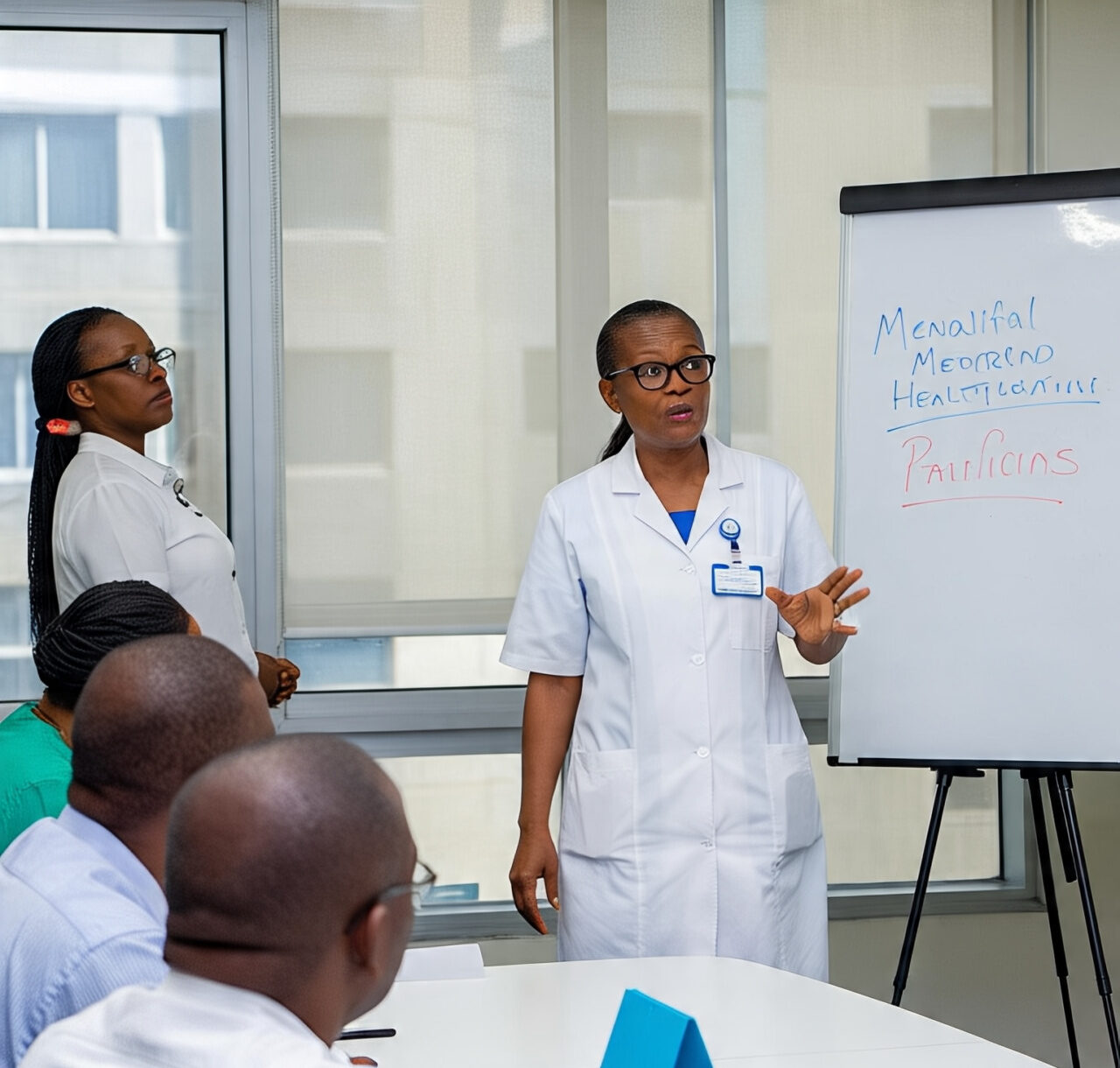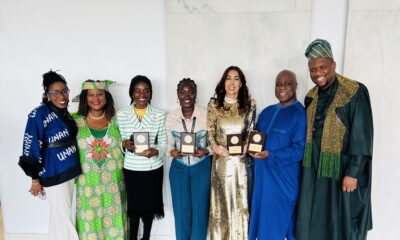Features
Chaste Inegbedion: How Policies and Workplaces Can Redefine Menstrual Health Equity

Photo by MetaAI
May 28th marks World Menstrual Hygiene Day. Growing up in Lagos, Nigeria, I witnessed firsthand the pervasive inequalities and stigma surrounding menstruation. For years, the simple, natural process of menstruation became a silent burden, impacting girls’ education and women’s daily lives. Commemorating this significant day reflects my journey from Lagos to advocating for a #PeriodFriendlyWorld globally, igniting my passion for change.
Since 2014, the world has celebrated International Menstrual Hygiene Day to raise awareness of the pervasive inequalities surrounding women’s and girls’ abilities to stay clean, safe and in school during their menstrual periods. Today, due to many awareness campaigns and free speaking forums, including notable celebrities coming forward and talking about menstruation, it’s possible to speak aloud about the natural process and not make women feel like victims of their own body.
For this year’s World Menstrual Hygiene Day, we take a look at the champions, the events, period positive workplace reports, technology, men’s support, business concerns and the crucial role of government in supporting women’s menstrual health – all topics we should be talking about and acting upon to lead healthy lives during periods.
Women Leaders Driving Menstrual Equity
Let’s celebrate an incredible lineup of women who are at the forefront of the menstrual equity movement, breaking barriers and inspiring action.
Wendy Laryea
An award-winning journalist, Wendy uses her powerful platform to amplify marginalised voices and shed light on crucial health issues, including menstrual hygiene.
Femi One
As a best-selling female rapper, Femi One leverages her influence in the arts to break down societal stigmas and empower young women.
Imoh Eboh
Through her impactful work as an actress, Imoh contributes to narratives that normalise menstruation and promote open dialogue in entertainment and beyond.
Modupe Oyekunle
As Founder/CRO of Masterpiece Resource Development Centre, Modupe is innovating sustainable solutions and driving economic empowerment in communities, often intertwined with health and hygiene.
Ina Jurga
As President of Menstrual Hygiene Day, Ina leads the global advocacy efforts, tirelessly driving the agenda for menstrual health and hygiene for all.
Sanna Thoresson
As Partnership Manager at Wash United, Sanna plays a crucial role in forging collaborations that ensure essential Water, Sanitation, and Hygiene (WASH) standards, vital for menstrual health, are met worldwide.
Celeste Mergens
Founder of Days for Girls, Celeste has built a truly global movement, providing sustainable menstrual products and health education, empowering millions of menstruators worldwide.
Katja Iversen
As CEO of the Museum for the United Nations, UN Live, Katja champions global conversations and action on critical issues, including those directly impacting women and girls.
Madame Gandhi
An award-winning artist and activist, Madame Gandhi uses her powerful music and platform to advocate fiercely for menstrual liberation and gender equality.
Candice Chirwa
Known passionately as the “Minister of Menstruation,” Candice is a leading voice challenging menstrual stigma and advocating for policy change, particularly among youth in South Africa.
These women exemplify courage, commitment, and tangible impact, paving the way for a more equitable and dignified future for all.
Men Fostering Support
Support for menstrual health is not a gendered issue; it’s a fundamental human rights issue that benefits everyone. Men have a crucial and increasingly recognised role to play as allies. At home, this means cultivating understanding, empathy and normalising conversations around menstruation. In the office, it means active collaboration by learning about menstruation and its diverse impacts, speaking up against period shame or dismissive attitudes, supporting initiatives like menstrual leave and accessible product provision and training managers to address period-related concerns with understanding, not judgment, fostering a truly supportive work culture.
When companies prioritise menstrual health, they benefit from higher retention, increased productivity and enhanced inclusion. On May 28, 2023, the Period Positive Workplace (PPW) initiative launched in celebration of Menstrual Hygiene Day, driven by the simple idea of engaging the private sector in the global menstrual equity movement.
To become a certified Period Positive Workplace, organisations must meet three core requirements: provide free period products in or near all bathrooms used by employees who menstruate, ensure that wash facilities comply with Water, Sanitation, and Hygiene (WASH) standards and inform employees that period products are and will continue to be provided.
Since its launch, Days for Girls (DfG) has been proud to lead the PPW steering committee, celebrating the certification of 277 Period Positive Workplaces across 45 countries, impacting over 290,000 employees. DfG is pleased to announce the publication of the 2025 Period Positive Workplace Impact Report, which includes illuminating insights from employees and managers at these certified workplaces, such as more than 50% of employees say the PPW positively impacted their work productivity and attendance, 5 more employees say managing menstruation is easy in a period-positive workplace and 90% of PPWs implemented additional menstrual health programming beyond the certification requirements.
Governments as Guardians of Menstrual Dignity
The menstrual equity movement cannot rest solely on the commendable efforts of non-profits and private companies. Robust governmental responsibility is paramount. Menstrual health is not merely a woman’s issue. It is fundamentally a public health, economic and human rights issue. We need National Menstrual Health Policies: governments must establish clear, enforceable policies that ensure access to products, education, and supportive environments; Integrated Government Agencies: Ministries and agencies dedicated to education, labour, and public health must seamlessly integrate menstrual equity into their core frameworks and budgets, ensuring it’s not an afterthought but a foundational element of policy and UN Permanent Missions: These missions must prioritise menstrual dignity in discussions around human rights, water, sanitation, and hygiene (WASH) initiatives, and the broader Sustainable Development Goals (SDGs), ensuring global commitment and accountability.
The Impact of MH Day Ambassadors
Central to this global movement are the MH Day Ambassadors, who actively advocate against the stigma surrounding menstruation on Menstrual Hygiene Day. They take part in a launch webinar where they are introduced to key messages and visual materials. By committing to incorporating these into their publications, they set a powerful example for others. They champion a significant cause, amplifying the message and inspiring action around the globe.
Menstrual products are essential, not optional. Menstruation is a natural bodily function and should not be viewed as shameful. Menstrual health is a vital aspect of overall health. Technology should support everyone, every day of the month. Let’s create a world where this statement requires no justification, no secrecy, and no shame.

















